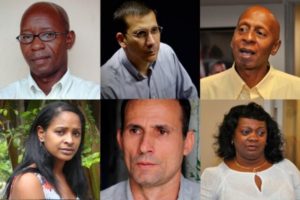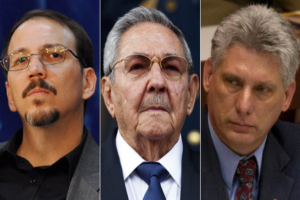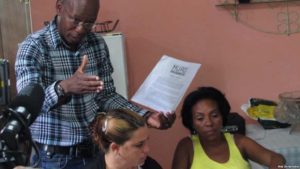In just under a year’s time, if President Castro keeps to his previously announced timetable, he will step down and cease to lead Cuba’s Council of State and Council of Ministers. Others in his generation are also expected to demit office.
Unless a constitutional change occurs, he will also cease to be the Commander in Chief of the Cuban armed forces. However, it is not clear, whether he and other historic figures still active in the leadership will continue to lead or play a central role in the Cuban Communist Party.
To achieve all of this, several far-reaching announcements will have to be made in the coming months about the country’s future leadership, constitution, and possibly, based on previous thinking, electoral reform. Despite this there have so far been no formal indications as to when this will happen or exactly what the process will involve.
It is suggested that Miguel Díaz-Canel, the First Vice President of Council of State and the Council of Ministers will assume the leadership.
Over the last year, he has travelled widely and been warmly welcomed in Africa, China, India and Vietnam, to Russia, and Venezuela which he has visited frequently. He has also participated in recent months in several important and sometimes challenging national debates in Cuba with young communists, at universities and with the media. He has also been a regular visitor to the country’s provinces meeting workers and others.
However, on January 2, on the occasion of the youth dominated celebration of the 59th anniversary of the Cuban Revolution, it was notable that the political address in the Plaza de la Revolución was delivered by Jennifer Bello Martínez, the President of the Federation of University Students (FEU), who is also a Member the Council of State. Then Ms Bello spoke about domestic and international issues, with President Castro presiding.
Notwithstanding, whoever succeeds President Castro, who is now 85, will have to be seen by Cuban of all ages as having political legitimacy, and the same moral authority, respect and importantly they will need to be seen as genuinely representative of Cuba’s new, educated, more diverse, free-thinking and nationalistic young people.
Speaking on April 3 to the Cuban media, the First Secretary of its Young Communist League (UJC), Susely Morfa González, said that the organisation she leads is now seeking to represent all Cuban youth. Ms Morfa – who has rapidly emerged as one of several younger national political figures in Cuba and who recently became a member of the country’s Council of State – made clear that in order to respond to the challenges facing the country, the UJC wants “to motivate new generations to learn more about Cuba’s history in a more inclusive, humane and creative way”.
What all this seems to suggest is that while preparations for generational change are underway, caution prevails, and the completion of the process may require the public emergence of a diverse group of younger leaders with charisma and managerial ability.
Irrespective, it appears likely that the transition, is also being constrained by other uncertainties.
TRANSITION UNCERTAINTIES.
Externally, Cuba will not know for some time yet the outcome of the policy review currently underway in Washington; its planning process is being impacted by the rapidly deteriorating internal situation in Venezuela; and following an abrupt change in US rhetoric on Russia, Havana may need to incorporate into its thinking, the possibility of a new form of cold war.
Internally, the uncertainties include: a poorly performing economy and a possibly lengthy period of economic austerity; unresolved differences between conservatives and reformers about further economic reform; the rapid growth of small entrepreneurs and non-state co-operatives; widespread related concern about income inequality and inflation; a desire for a wider range of freedoms among the young; and a belated recognition that if the Communist Party and mass organisations are to remain relevant to the changed thinking of young people, they have to adapt rapidly.
In a TV program, Julio Garcia Oliveras, one of Cuba’s historic generation who fought in the revolution, speaking about his life, the lessons learnt, and Cuban history, said: “We are now in a stage of change, and youth needs to master all these experiences and be clear (about) the problem of unity, with which we have defeated all the manoeuvres of the enemy. If we divide (amongst) ourselves we are lost in a world totally contrary to a Socialist Revolution … I live clinging to the concept of unity as the most important concept on which young people have to reflect”. He went on to observe that while everything can be discussed, a single sense of purpose will need to be internalised.
Before long Cuba’s leadership will have to clarify to the Cuban people how generational change will occur, and what and who will be involved. The process is meant to be complete by the time of next Cuban Communist Party Congress in 2021: it is likely to be a real challenging.
(Opinión) La Cautelosa transición de Poder en Cuba en el 2018.
En menos de un año, si el presidente Castro mantiene su calendario previamente anunciado, dimitirá y dejará de dirigir el Consejo de Estado y Consejo de Ministros de Cuba. Otros en su generación también se espera que demit oficina.
A menos que se produzca un cambio constitucional, dejará de ser comandante en jefe de las fuerzas armadas cubanas. Sin embargo, no está claro si él y otras figuras históricas aún activas en el liderazgo seguirán liderando o desempeñando un papel central en el Partido Comunista de Cuba.
Para lograr todo esto, en los próximos meses habrá que hacer varios anuncios de gran alcance sobre el futuro liderazgo del país, su constitución y, posiblemente, sobre la base del pensamiento previo, la reforma electoral. A pesar de esto, hasta ahora no ha habido indicaciones formales sobre cuándo ocurrirá esto o exactamente lo que el proceso implicará.
Se sugiere que Miguel Díaz-Canel, Primer Vicepresidente del Consejo de Estado y del Consejo de Ministros asuma el liderazgo y quien durante el último año, ha viajado ampliamente y ha sido calurosamente recibido en África, China, India y Vietnam, a Rusia y Venezuela, que ha visitado con frecuencia. También ha participado en los últimos meses en varios debates nacionales importantes ya veces desafiantes en Cuba con jóvenes comunistas, universidades y medios de comunicación. También ha sido un visitante regular de las provincias del país reuniéndose con los trabajadores y otros.
Sin embargo, el 2 de enero, con motivo de la celebración dominicana del 59 aniversario de la Revolución Cubana, fue notable que el discurso político en la Plaza de la Revolución fue entregado por Jennifer Bello Martínez, Presidenta de la Federación de la Universidad Estudiantes (FEU), que también es miembro del Consejo de Estado. Luego, la Sra. Bello habló sobre asuntos nacionales e internacionales, presidido por el Presidente Castro.
No obstante, quienquiera que suceda al presidente Castro, que ahora tiene 85 años, tendrá que ser visto por los cubanos de todas las edades como teniendo legitimidad política, y la misma autoridad moral, respeto e igualmente importante será que tengan que ser vistos como genuinamente representativos de los jóvenes cubanos, educados, más diversos, libres de pensamiento y nacionalistas.
En declaraciones el 3 de abril a los medios de comunicación cubanos, la Primera Secretaria de la Liga Juvenil Comunista (Susana Morfa González), Susely Morfa, dijo que la organización que lidera ahora busca representar a todos los jóvenes cubanos. La Sra. Morfa -que se ha convertido rápidamente en una de las figuras políticas más jóvenes de Cuba y recientemente miembro del Consejo de Estado del país- dejó claro que para responder a los desafíos del país, la UJC quiere “motivar Nuevas generaciones para aprender más sobre la historia de Cuba de una manera más inclusiva, humana y creativa “.
Lo que todo esto parece sugerir es que mientras los preparativos para el cambio generacional están en marcha, la precaución prevalece, y la terminación del proceso puede requerir la aparición pública de un grupo diverso de jóvenes líderes con carisma y capacidad de gestión.
Independientemente, parece probable que la transición, también está siendo restringida por otras incertidumbres.
INCERTIDUMBRES DE LA TRANSITION EN CUBA.
Externamente, Cuba no sabrá por algún tiempo todavía el resultado de la revisión de políticas actualmente en curso en Washington; Su proceso de planificación se ve afectado por la rápida deterioración de la situación interna en Venezuela; Y después de un cambio abrupto en la retórica estadounidense sobre Rusia, La Habana puede necesitar incorporar en su pensamiento la posibilidad de una nueva forma de guerra fría.
Internamente, las incertidumbres incluyen: una economía de bajo rendimiento y un período posiblemente largo de austeridad económica; Las diferencias no resueltas entre los conservadores y los reformadores acerca de la reforma económica; El rápido crecimiento de pequeños empresarios y cooperativas no estatales; Preocupación generalizada relacionada con la desigualdad de los ingresos y la inflación; El deseo de una gama más amplia de libertades entre los jóvenes; Y un tardío reconocimiento de que si el Partido Comunista y las organizaciones de masas siguen siendo relevantes para el cambio de pensamiento de los jóvenes, tienen que adaptarse rápidamente.
En un programa de televisión, Julio García Oliveras, uno de la generación histórica de Cuba que luchó en la revolución, hablando de su vida, las lecciones aprendidas y la historia cubana, dijo: “Ahora estamos en una etapa de cambio y la juventud necesita dominar Todas estas experiencias y ser claro sobre el problema de la unidad, con el que hemos derrotado todas las maniobras del enemigo.si nos dividimos entre nosotros mismos estamos perdidos en un mundo totalmente contrario a una revolución socialista … yo vivo Aferrándose al concepto de unidad como el concepto más importante sobre el cual los jóvenes tienen que reflexionar “. Continuó observando que si bien todo puede ser discutido, será necesario interiorizar un solo sentido del propósito.
En poco tiempo, el liderazgo de Cuba tendrá que aclarar al pueblo cubano cómo se producirá el cambio generacional y qué y quién estará involucrado. El proceso está destinado a ser completo en el momento del próximo Congreso del Partido Comunista de Cuba en 2021: es probable que sea un verdadero reto.
Agencies/ BarbadosAdvocate/David Jessop/Caribbean Council/ Extractos/ Internet Photos/ Arnoldo Varona/ TheCubanHistory.com.
THE CUBAN HISTORY, HOLLYWOOD.










